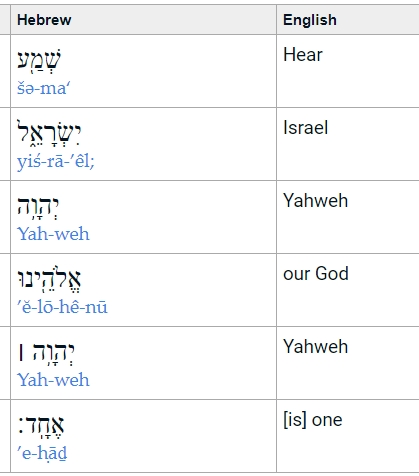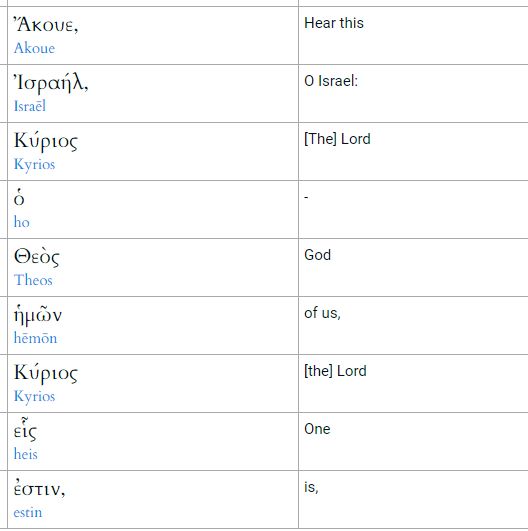
“Ye call me Master and Lord: and ye say well; for so I am.”
John 13:13
Jesus referred to Himself as Master and Lord. In this article, we’re going to take a closer look at this word “Lord”.
In the original Greek, it is the word κύριος (kyrios). It appears hundreds of times in the New Testament.
Kyrios has the meaning of “one exercising absolute ownership rights, power, authority.

Sometimes it can be used as a title of respect, like in the word, Sir. However, it is most often used as a title for God in the New Testament. The authors used the words theos for “God” and kurios for “Lord” in more than 650 places.
Let’s look at an example.
The Shema Yisrael in the Torah Deuteronomy 6:4 reads:
“Hear, O Israel: The LORD our God, the LORD is One.”

You will notice that the word Yahweh is translated into English as LORD, i.e. the name of God, and the word Elohim is translated as God.
Now let’s look at this this verse when it is quoted in the New Testament. Mark 12:29 reads: “…Hear, O Israel: The Lord our God, the Lord is one…”

You will notice that the word for Lord is κύριος (kyrios), and the word for God is Theos. These are unmistakable references for God.
This is what we see throughout the New Testament, where Theos was used as a general word for God, and Kyrios was a more personal name designating God as the personal Lord of all.
(When verses from the Old Testament are quoted in the Greek New Testament, they always followed the Septuagint’s use of Theos and Kyrios. Septuagint is the Greek translation of the Old Testament made around 300 BC).
“It is the Greek equivalent to the Hebrew word Yahweh…. This is the divine name for God. Jesus Christ is designated as the Lord in many New Testament references. This is the consistent truth of Scripture – Jesus is Yahweh…”
Don Stewart, What Does The Greek Word Kurios Mean?, BlueLetterBible.org
In both the Septuagint and in the New Testament, God is called Theos and Kyrios. The Septuagint uses the Greek word Theos (God) to translate Elohim and El, and Kyrios (Lord) to translate both Adonai and Yahweh. Kyrios is used over 7000 times.
When used as a proper noun, the word Kyrios means the same thing as Yahweh in Hebrew. Kyrios carried the connotation of God’s personal name.
It is, therefore, particularly striking that Jesus is also called Theos and Kyrios.
In John 20:28, Thomas declares to Jesus, “My Lord and My God!”
The original Greek text is emphatic, Ὁ Κύριός μου καὶ ὁ Θεός μου. or literally “The Lord of me and the God of me!” He addressed Jesus with titles of deity, calling Him Lord (kyrios) and God (theos).
Jesus applied the title of LORD, κύριος (kyrios), to Himself on many occasions. Let’s pick out 3 examples for now.
1. “You call me Teacher and Lord (kyrios), and you are right, for so I am.”
John 13:13
2. Jesus claimed that He is the Lord (kyrios) of the Sabbath. (cf. Luke 6:5)
Since God created, instituted and ordained the Sabbath (cf. Exodus 2:3), He is the sole Author, authority and owner of the Sabbath. God alone is Sovereign over the Sabbath and rules over it, as the “Kyrios”.
Therefore, when Jesus said that He s the LORD OF THE SABBATH, He was telling the Pharisees he was speaking to, that He was God, in no uncertain terms!
3. If anyone asks you, ‘Why are you untying it?’ you shall say this: ‘The Lord (kyrios) has need of it.’” (Luke 19:31)
Skeptics might argue, “Lord is just a term like ‘sir’. Anyone can be addressed as ‘sir’ as a form of respect.”
Note the definite article, “THE”, as in “THE Lord” in the above verse. It means it is specific and unique to only one. Besides, it doesn’t make sense to say that Jesus is the “sir” of the Sabbath! Yes, there can be many lords (and they could be addressed as sir) but there is only One Lord of all lords.
Likewise, there can be many kings, but there is only one King of all kings. This exalted status can be attributed to none but God, and we see in the Bible that it is attributed to Jesus. (Revelation 17:14, 19:16).
In the Arabic, the word Ar-Rabb is translated as The Lord. It is the name of Allah.
The Meaning of Ar-Rabb, the Lord
Ar-Rabb is the owner who has full authority over his property. Ar-Rabb, linguistically means, the master or the one who has the authority to lead. All of these meanings are correct for Allah. When it is alone, the word Rabb is used only for Allah. As for other than Allah, it can be used to say Rabb Ad-Dar, the master of such and such object. Further, it was reported that Ar-Rabb is Allah’s Greatest Name.
Tafsir Ibn Kathir, Al-Fatihah 1:2
The Arabic translation for Luke 19:31 shows Jesus referring to Himself as Ar-Rabb.
If anyone asks you, ‘Why are you untying it?’ you shall say this: ‘The Lord (Ar-Rabb) has need of it.’” (Luke 19:31)
In Greek, it is the word ‘ho kyrios.’ If Jesus claims to be Ar-Rabb, Ho Kyrios, The Lord, who is He claiming to be?
Let’s look at several more examples on how the word kyrios occurs in Scripture.
God Is Called Kyrios
“Blessed be the Lord (kyrios) God of Israel, for he has visited and redeemed his people.” Luke 1:68
Father and Messiah Called Kyrios
For David did not ascend into the heavens, but he himself says, “‘The Lord said to my Lord, “Sit at my right hand.” Acts 2:34
Jesus Is Called Kyrios By Angels
For unto you is born this day in the city of David a Savior, who is Christ the Lord (kyrios). Luke 2:11
Jesus is Called Kyrios By His Disciples
That disciple whom Jesus loved therefore said to Peter, “It is the Lord (kyrios)!” John 21:7
Jesus is Called Kyrios In The Gospels
And when the Lord (kyrios) saw her, he had compassion on her and said to her, “Do not weep.”
Jesus is called Kyrios In the Epistles
For to this end Christ died and lived again, that he might be Lord (kyrios) both of the dead and of the living. Romans 14:9
Jesus Is Called Kyrios By The Father
He also says, “In the beginning, Lord (kyrios), you laid the foundations of the earth, and the heavens are the work of your hands. Hebrews 1:10
Notes from Vines Expository Dictionary
1. Kyrios is the Septuagint and NT representative of Hebrew [YAHWEH]
(‘Lord’ in English translations)
see Mat 4:7; Jam 5:11, e.g., of adonai, Lord, Mat 22:44, and of Adonay, Lord, Mat 1:22; it also occurs for Elohim, God, 1Pe 1:25.
2. Christ Himself assumed the title, Mat 7:21, 22; 9:38; 22:41-45; Mar 5:19
(cp. Psa 66:16; the parallel passage, Luk 8:39, has ‘God’); Luk 19:31; Jhn 13:13, apparently intending it in the higher senses of its current use, and at the same time suggesting its OT associations.
3. His purpose did not become clear to the disciples until after His resurrection, and the revelation of His Deity consequent thereon. Thomas, when he realized the significance of the presence of a mortal wound in the body of a living man, immediately joined with it the absolute title of Deity, saying, ‘My Lord and my God,’ Jhn 20:28. Thereafter, except in Act 10:4; Rev 7:14, there is no record that kurios was ever again used by believers in addressing any save God and the Lord Jesus; cp. Act 2:47 with Act 4:29, 30.
4. How soon and how completely the lower meaning had been superseded is seen in Peter’s declaration in his first sermon after the resurrection, ‘God hath made Him, Lord,’ Act 2:36, and that in the house of Cornelius, ‘He is Lord of all,’ Act 10:36; cp. Deu 10:14; Mat 11:25; Act 17:24. In his writings the implications of his early teaching are confirmed and developed. Thus Psa 34:8, ‘O taste and see that Jehovah is good,’ is applied to the Lord Jesus, 1Pe 2:3, and ‘Jehovah of Hosts, Him shall ye sanctify,’ Isa 8:13, becomes ‘sanctify in your hearts Christ as Lord,’ 1Pe 3:15.
5. So also James who uses kurios alike of God, Jam 1:7 (cp. Jam 1:5); 3:9; 4:15; 5:4, 10, 11, and of the Lord Jesus, Jam 1:1 (where the possibility that kai is intended epexegetically, i.e. = even, cp. 1Th 3:11, should not be overlooked); Jam 2:1 (lit., ‘our Lord Jesus Christ of glory,’ cp. Psa 24:7; 29:3; Act 7:2; 1Cr 2:8); 5:7, 8, while the language of Jam 4:10; 5:15, is equally applicable to either.
6. Jude, Jud 1:4, speaks of ‘our only — Lord, Jesus Christ,’ and immediately, Jud 1:5, uses ‘Lord’ of God (see the remarkable marg. here), as he does later, Jud 1:9, 14.
7. Paul ordinarily uses kurios of the Lord Jesus, 1Cr 1:3, e.g., but also on occasion, of God, in quotations from the OT, 1Cr 3:20, e.g., and in his own words, 1Cr 3:5, cp. 1Cr 3:10. It is equally appropriate to either in 1Cr 7:25; 2Cr 3:16; 8:21; 1Th 4:6, and if 1Cr 11:32 is to be interpreted by 1Cr 10:21, 22, the Lord Jesus is intended, but if by Hbr 12:5-9, then kurios here also = God. 1Ti 6:15, 16 is probably to be understood of the Lord Jesus, cp. Rev 17:14.
8. Though John does not use ‘Lord’ in his Epistles, and though, like the other Evangelists, he ordinarily uses the personal Name in his narrative, yet he occasionally speaks of Him as ‘the Lord,’ Jhn 4:1; 6:23; 11:2; 20:20; 21:12.
9. The full significance of this association of Jesus with God under the one appellation, ‘Lord,’ is seen when it is remembered that these men belonged to the only monotheistic race in the world. To associate with the Creator one known to be a creature, however exalted, though possible to Pagan philosophers, was quite impossible to a Jew.
10. It is not recorded that in the days of His flesh any of His disciples either addressed the Lord, or spoke of Him, by His personal Name. Where Paul has occasion to refer to the facts of the Gospel history he speaks of what the Lord Jesus said, Act 20:35, and did, 1Cr 11:23, and suffered, 1Th 2:15; 5:9, 10. It is our Lord Jesus who is coming, 1Th 2:19, etc. In prayer also the title is given, 1Th 3:11; Eph 1:3; the sinner is invited to believe on the Lord Jesus, Act 16:31; 20:21, and the saint to look to the Lord Jesus for deliverance, Rom 7:24, 25, and in the few exceptional cases in which the personal Name stands alone a reason is always discernible in the immediate context.
11. The title ‘Lord,’ as given to the Savior, in its full significance rests upon the resurrection, Act 2:36; Rom 10:9; 14:9, and is realized only in the Holy Spirit, 1Cr 12:3.” *
[* From Notes on Thessalonians, by Hogg and Vine, p. 25.]